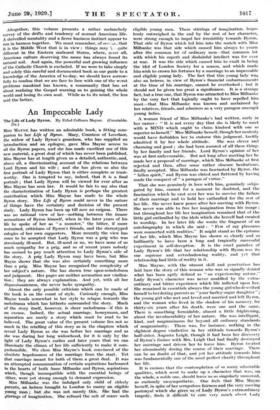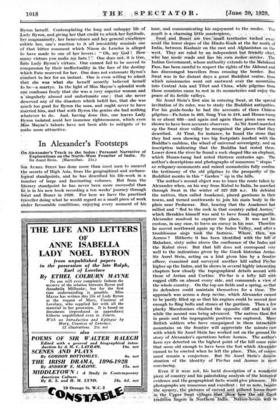An Impeccable Lady
The Life of Lady Byron. By Ethel Colburn Mayne. (Constable. 21s.)
Miss MAYNE has written an admirable book, a fitting com- panion to her Life of Byron. Mary, Countess of Lovelace, the widow of Lady Byron's grandson, who has supplied an introduction and an epilogue, gave Miss Mayne access to all the Byron papers, and she has made excellent use of this new material, a great deal of which has never been published. Miss Mayne has at length given us a detailed, authentic, and, above all, a discriminating account of the relations between Lord Byron and his wife ; and she has given us also the first portrait of Lady Byron that is either complete or trust- worthy. One is tempted to say, indeed, that it is a final portrait ; that Lady Byron will be viewed for ever after as Miss Mayne has seen her. It would be fair to say also that the characterization of Lady Byron is perhaps the greatest contribution which Miss Mayne has made to the whole Byron story. Her Life of Byron could never in the nature of things have the certainty and decision of the present study. Lady Byron has been up till now an enigma. There was no rational view of her—nothing between the insane accusations of Byron himself, when in the later years of his life he spoke of her as " a monster," the bitter, if more restrained, criticisms of Byron's friends, and the stereotyped eulogies of her own supporters. More recently the view has come to be accepted that Lady Byron was a prig who was atrociously. ill-used. But, ill-used or no, we have none of us much sympathy for a prig, and so of recent years nobody has seemed to pay much attention to Lady Byron's side of the story. A prig. Lady Byron may have been, but Miss Mayne shows that she was also certainly something more than a prig. Miss Mayne has recognized the complexity of her subject's nature. She has shown true open-mindedness and judgment. Her pages are neither accusation nor vindica- tion : they are always explanation. And yet, with all her dispassionateness, she never lacks sympathy.
Almost the only possible criticism which can be made of the book is on the count of style. Curiously enough, Miss Mayne tends somewhat in her style to relapse towards the melodrama which has hitherto surrounded the story. Much of the story itself, however, is sheer melodrama—if this is an excuse. Indeed, the actual marriage, honeymoon, and separation are surely a story which must be read to be believed. The great value of the present volume lies not so much in the retelling of this story as in the chapters which reveal Lady Byron as she was before her marriage and as she was during her long widowhood, for it is only by the light of Lady Byron's earlier and later years that we can illuminate the climax of her life sufficiently to make it com- prehensible. We close Miss Mayne's book convinced of the absolute hopelessness of the marriage from the start. Yet that marriage meant for both of them a great deal. It was an attempted consummation of certain aspirations harboured in the hearts of both Anne Milbanke and Byron, aspirations which, though incompatible with the essential beings of either, were yet strong enough to demand expression.
Miss Milbanke was the indulged only child of elderly parents, an heiress brought to London to marry an eligible young man ; but she was not merely this. She had the stirrings of imagination. She refused the suit of many such eligible young men. These stirrings of imagination, hope. lessly outweighed in the end by the rest of her character, were strong enough to impel her irresistibly towards Byron. That side of Byron which led him into the match with Miss Milbanke was that side which caused him always to yearn after the common lot of ordinary men—that common lot with which his superb and disdainful intellect was for ever at war. It was the side which caused him to exalt in being the idol of London Society for a season, and which made him wish to crown his fortunes by a marriage to an impeccable and eligible young lady. The fact that this young lady was also an heiress, in view of Byron's financial embarrassments at the time of his marriage, cannot be overlooked ; but it should not be given too great a significance. It is a strange fact, but a true one, that Byron was attracted to Miss Milbanke by the very fact that logically ought to have repelled him most—that Miss Milbanke was known and acclaimed by her relatives, friends, and admirers as a very paragon amongst young ladies.
A woman friend of Miss Milbanke's had written, early in her career : " It is not every day that she is likely to meet with a MIND which ought to claim kindred with one so superior as herself." Miss Milbanke herself, though her modesty would have forbidden her to endorse this judgment, tacitly admitted it by her whole attitude. She was clever and charming and good ; she had been assured of all these things by her family and her friends. Lord Byron's opinion of her was at first unfavourable. But not long after meeting her he made her a proposal of marriage, which Miss Milbanke at first rejected and then, after some rather obscure hesitations, finally accepted. Miss Milbanke was fascinated by Byron, the " fallen spirit," and Byron was elated and flattered by having made the conquest of " a paragon of virtue."
That she was genuinely in love with him, genuinely subju- gated by him, cannot for a moment be doubted, and the fascination which he cast over her was to survive the failure of their marriage and to hold her enthralled for the rest of her life. She never knew peace after her meeting with Byron. She never was able to free her imagination from his image ; but throughout her life her imagination remained that of the little girl enthralled by the idols which she herself had created to worship. In her later life she wrote the fragment of an autobiography in which she said : " Few of my pleasures were connected with realities." It might stand as the epitome of her life, which Miss Mayne has shown so. clearly and so brilliantly to have been a long and tragically successful experiment in self-deception. It is the cruel paradox of Lady Byron's life that her relationship with Byron was its one supreme and overshadowing reality, and yet that relationship had little of reality in it.
Miss Mayne, with the utmost skill and penetration has laid bare the story of this woman who was so signally denied what has been aptly defined as " an experiencing nature." Lady Byron's character was never modified by the extra- ordinary and bitter experience which life inflicted upon her. She remained in essentials always the young girl who described herself to herdoting parents as "your barley-sugar daughter "; the young girl who met and loved and married and left Byron, and the woman who lived in the shadow of his memory, for thirty-six years after his death, were one and the same. There is something formidable, almost a little frightening, about the invulnerability of her nature. She was intelligent, kind, and magnanimous far beyond . all ordinary standards of magnanimity. There was, for instance, nothing in the slightest degree vindictive in her attitude towards Byron's half-sister, Augusta Leigh, though it had been her discovery of Byron's liaison with Mrs. Leigh that had finally destroyed her marriage and driven her to leave him. Byron treated her abominably during the course of their marriage. There can be no doubt of that, and yet her attitude tnwards him was fundamentally one" ofthe most perfect charity throughout her life.
It is curious that the contemplation of so many admirable qualities, which went to make up a character that was, on the whole, a noble one, should leave us so singularly unmoved, so curiously unsympathetic. One feels that Miss Mayne herself, in spite of her scrupulous fairness and the very moving portrayal which she gives us of Lady Byron's extraordinary tragedy, finds it difficult - to care very much ,►hni,t Lady
Byron herself. Contemplating the long and unhappy life of ,Lady Byron, and giving her that credit to which her fortitude, her magnaniMity, her benevolenee 40d:her-general eXeellenco entitle her, one's reaction to it all irresistibly reminds one of that bitter comment which Ninon de Lenelos is alleged "to have made to one of her loveTS : " Oh, my Rod I: How
,many virtues you make me hate One does not; it is true,_ date Lady Byrim's virtues. One cannot fail to be moved to compassion by their ineffectuality in the face of the destiny which Fate reserved for her. One does not extenuate Byron's ,Conduct to her for an instant. One is even willing to admit that she was what she herself secretly believed herself to be—a martyr. In the light of Miss Mayne's splendid work one confesses freely that she was .a yery superior woman and a singularly abused and unfortunate one ; that she never deserved any of the disasters which befell her, that she was pitch too good for Byron the man, and ought never to have Married him, and that with Byron the genius she had nothing whatever to do. And, having done this, one leaves Lady Byron isolated amid her immense righteousness, which ern Miss Mayne's talents have not been able to mitigate or to hake more attractive.









































 Previous page
Previous page